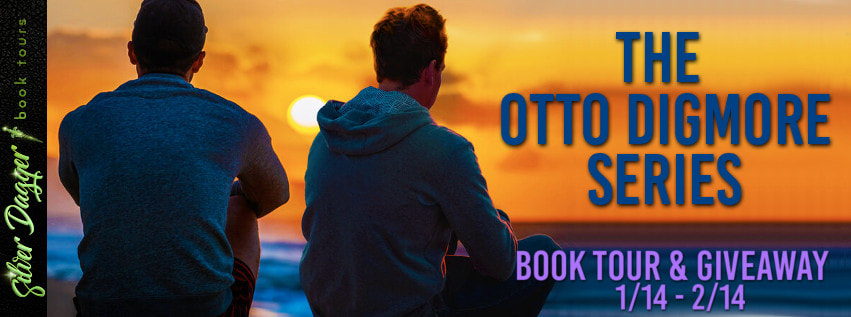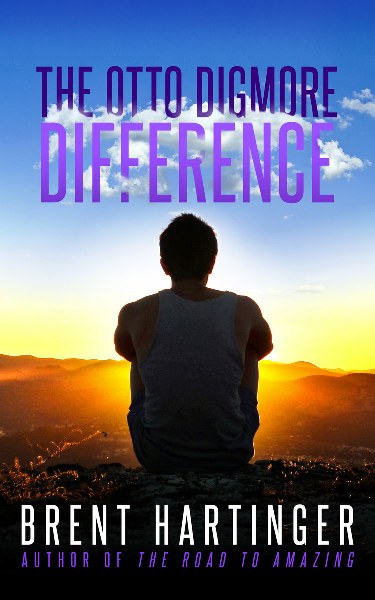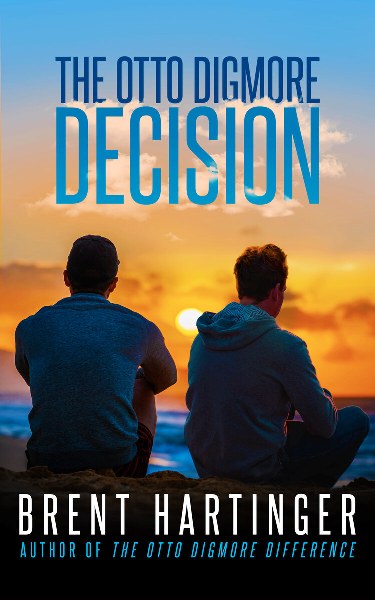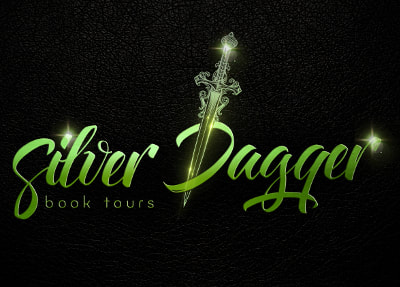The Otto Digmore Difference
The Otto Digmore Series Book 1
by Brent Hartinger
Genre: New Adult Humorous M/M Romance
“Road trip!”
Otto Digmore is a 26-year-old gay guy with dreams of being a successful actor, and he's finally getting some attention as a result of his supporting role on a struggling sitcom. But he's also a burn survivor with scars on half his face, and all indications are that he's just too different to ever find real Hollywood success.
Now he's up for an amazing new role that could change everything. Problem is, he and his best friend Russel Middlebrook have to drive all the way across the country in order to get to the audition on time.
It's hard to say which is worse: the fact that so many things go wrong, or that Russel, an aspiring screenwriter, keeps comparing their experiences to some kind of road trip movie.
There's also the fact that Otto and Russel were once boyfriends, and Otto is starting to realize that he might still have romantic feelings for his best friend.
Just how far will Otto go to get the role, and maybe the guy, of his dreams?
Author Brent Hartinger first introduced the character of Otto Digmore in 2005, in his Lambda Award-winning books about Russel Middlebrook. Back then, Otto was something pretty unusual for YA literature: a disabled gay character.
Now, more than a decade later, Otto is grown up and finally stepping into the spotlight on his own. The Otto Digmore Difference, the first book in a new stand-alone series for adults, is about much more than the challenges of being "different." It's also about the unexpected nature of all of life's journeys, and the heavy price that must be paid for Hollywood fame.
But more than anything, it's a different kind of love story, about the frustrating and fantastic power of the love between two friends.
The Otto Digmore Decision
The Otto Digmore Series Book 2
"If we get caught, they'll throw us in jail. On the other hand, we'll have been involved in one of the craziest Hollywood stories I've ever heard, and maybe someone will want to turn *that* into a movie!"
Otto Digmore is back, still trying to make it as an actor in Hollywood (despite his facial scars), but frustrated by all the schemers who'll stab you in the back to get ahead. But then Otto's good friend Russel Middlebrook sells a screenplay, a heist movie set in the Middle Ages — and Otto has been cast in an important supporting role! For twelve weeks, Otto and Russel will be on location together in England and Malta.
Problem is, once production is underway, it quickly becomes clear that the director is ruining Russel's script. If the movie ends up being the bomb that both Otto and Russel expect it to be, it could destroy both their Hollywood careers forever.
But Otto and Russel aren't willing to take that chance. Together, they hatch a crazy plan to make a good movie behind the director's back! But how far are they willing to go to save their careers? Are they willing to become exactly the kind of scheming backstabbers they always said they hated?
The Otto Digmore Decision is partly a caper story, partly a humorous Hollywood satire. It’s also an inside look at the struggles of anyone “different,” and it’s even something of a love story, except it’s one between two friends.
More than anything, The Otto Digmore Decision proves the old adage about creative pursuits: the most interesting drama always happens behind the scenes!
How is Good Acting Like Being a Power-Bottom? (And Bad Acting Like Being a Bossy Bottom?)
An Excerpt from The Otto Digmore Decision
By Brent Hartinger
This is an excerpt from my latest book, The Otto Digmore Decision, about a gay disabled guy trying to make it as an actor in Hollywood.
Some directors are nurturing, creating an emotional bond with their actors, an environment of total trust right from the start. That way they're able to tell the actors uncomfortable truths in an atmosphere of love and support. These directors have a way telling you exactly what you most need to hear, at exactly the moment when you most need to hear it.
Other directors are more disciplinarian, like a hard-ass sports coach. These directors are harder on their actors, and much less supportive. At times they might be distant or even outright cold with you. This can be tough in the moment, but at some point, you realize it's part of a long-term strategy. They're being distant with you because they want your character to feel lost. Or they're hyper-critical because they want you to find your character's anger. Once you make the breakthrough, you end up being grateful that the director helped you access some difficult part of the character that couldn't otherwise reach on your own.
Then there's Gabriel St. Pierre.
He isn't either kind of director. He doesn't seem to have much strategy at all. In the days of rehearsal that follow, I learn his direction is all obvious, surface stuff. He directs us like we're doing a television movie: really broad and simple, everything underlined so no one could ever possibly miss it. He doesn't even try to look beyond the scene, to see what's going on under the surface.
Which is a problem because the director is supposed to be the one with the vision, the person who understands the story more than anyone. A good director knows how everything fits together, and how every little thing serves the overall movie. He's the one who makes everyone else's choices make sense — not just the actors, but the set and costume designers, the director of photography, the light and sound technicians, even the guy who knocks the clapperboard together. Every single person involved with the movie.
If Gabriel has a vision, I can't see it.
Then again, maybe he doesn't need a vision, because Russel's screenplay is good. If he just films the thing the way Russel wrote it, maybe it'll still end up an okay movie.
Two weeks after rehearsals begin, we're rehearsing again, a flirty, subtext-y scene between Benjamin and Felicia in Benjamin's workshop. Benjamin is explaining the forging process to Felicia, talking about anvils and tongs and bellows, and the process that makes things hotter and harder. Except he's really talking about the physical attraction between him and Felicia. It's clever dialogue, more than just sex puns. My character is outside, and overhears through a window, and then Dodge stares across the marketplace at Mika, as if he's wondering if any woman will ever see him the way Benjamin and Felicia are starting to see each other.
"More!" Gabriel directs me at one point. "When you look at Mika, you have stars in your eyes. She's everything you want a woman to be!"
Which is terrible direction. When Dodge looks at Mika, he doesn't have stars in his eyes. He has longing, yes, but also pain and fear and resentment, and also lust because I've already decided that Dodge is a twenty-nine year-old virgin. He went to a brothel once as a teenager, and the women all looked horrified that he might touch them, so he left and never went back.
Before long, we break for lunch.
By now, I've learned that Clayton Beck never goes anywhere without a slightly rotating entourage of at least three people. They wait in the hallway while we rehearse. They must also listen at the door because the second Gabriel calls for lunch, they appear and whisk Clayton off to see and be seen at one of the crazy-expensive bistros right outside the lot. I'm a little disappointed because I'd hoped he and I might go to lunch together. By this point, I've only said a grand total of eight sentences to Clayton, not counting scenes where our characters have talked. Even in real life, he has that perfect movie star drawl.
But Allison doesn't have an entourage, and she asks me if I want to grab a bite.
"I'd love to," I say, and we end up getting sandwiches at one of the commissaries, then searching for a place to eat outside. Along the way, we talk about our different pasts, and I learn that her sophistication is a conscious choice: a public identity she made up. She's really a small town girl from Alabama.
"You don't have an accent," I say.
"Lost that before I lost my virginity," she says proudly, also revealing her twang.
I feel stupid I hadn't considered that her sophistication was all an act. People in Hollywood are famous for reinventing themselves. I never cared about the way I dressed until I moved here.
We find a bench to eat, and I say, "Hey, what did you mean the other day when you said that the movie will be good if Gabriel doesn't screw it up?" I've been meaning to ask her this for a while.
She takes a huge bite of her sandwich and talks with her mouth full. "What?"
"The day of the first read-through," I say.
She swallows and thinks for a second. "Just something I heard. Why? What do you think of him so far?"
I have an opinion, but I'm not sure I want to say it out loud in case it gets back to him.
"Come on," she says. "Just say it." She has mustard on her lips, and also a little smirk.
I laugh. "Okay, I'm not very impressed. But —"
"—you're still hoping it might be a strategy to get something out of you? Yeah, sorry, no, I think he really is that thick. 'When you look at her, you've got stars in your eyes.' Ha!"
"Are you saying he's a bad director?"
"Sure as hell seems that way."
"Snark was good." This is the last movie he directed.
"I heard they saved it in editing. And he had a good DP — like, really good. Who Gabriel fought every step of the way." The DP is the director of photography, also known as the cinematographer. The guy who controls how the movie looks.
"Maybe that will happen this time too."
"Maybe," she says, but it's clear she doesn't believe it.
"So what are you saying? You think the movie's going to suck?"
"Oh, anything can suck. Who the fuck knows?"
"You're not worried?"
She takes another bite right before she speaks, talking with her mouth full again. I like that she already feels like she can be her real self around me. That she doesn't need to pretend to be a dainty sophisticate like she's on The Tonight Show with Jimmy Fallon.
"I'm always worried," she says. "But there's nothing I can do about the movie itself. The only thing I control is my own performance. So when a director is bad, I use a strategy. Then even if the movie's a piece of shit, I don't embarrass myself."
"What kind of strategy?"
She swallows and thinks for a second. "You're gay, right?"
I'm surprised but try not to act offended or anything. "Uh, how did you know…?"
"Good gaydar. So if you're gay, you know the difference between a bossy bottom and a power bottom."
"I do?" Now I'm even more surprised. What is Allison talking about? Why did she bring this up?
"Don't you?" she goes on.
"Let's say I don't."
"Well, both a bossy bottom and a power bottom are when the bottom is in control of the fuck, right? Not the top, which is more typical. A bossy bottom is what it sounds like: someone who fusses and complains, and is just generally difficult to be around. High maintenance. In the end, it's going to be a bad fuck — for the top, but also for the bottom."
I laugh because I don't know what else to do. "Okay."
"But a power bottom is when the bottom takes control, but it ends up being a good fuck. So how does he do that? He's in charge, but he works with the top. He doesn't bitch and complain. He might figure out what the top wants, and then use that to guide the top to do what the bottom wants. Or he might dominate the top, forcing him to satisfy the bottom's needs, but in such a way that it totally gets the top off too. Basically, rather than ignore the top, treating him like he's a dildo or a blow-up doll, he gets inside the top's head, working with his desires, opening him up and getting him to a place where the bottom is totally in control."
I'm trying very hard not to blush. And failing.
"This is all very interesting," I say. "But what does it have to do with what we were talking about?" I'm also wondering how she knows so much about gay male sex, although even as I think this, I realize that maybe heterosexuals have a "top" and a "bottom" in their sex too, and it's not necessarily the man who's the top. I've never had sex with a woman.
"Well, it's exactly the same dynamic for an actor and director," Allison explains. "The director is the top, obviously, and the actor is the bottom — again, obviously. And usually the director is in control, just like in sex. But if it's a bad director, the actor needs to take control, because otherwise you end up with a bad performance. But you can't be a bossy bottom, because you'll still end up with a bad show. So you need to be a power bottom. You need to take control of your own performance, but do it in such a way that the director is on board, and loves you for taking charge."
I think about all this. Her description of sex isn't anything like the sex I've had in my life. But apart from the actual "sex" thing, she's making a certain kind of sense. It's a good metaphor or whatever.
I burst out laughing.
"What?" Allison says, gauging me with a smile.
"That might be the smartest thing I've ever heard about the actor-director relationship in my entire life."
"Right? It's spot-on, isn't it? I want to write it up and post it somewhere, but I can't do it under my real name."
"So you and I need to power-bottom our way to good performances? Turn Gabriel into our little bitch?"
"Now you've got it." She gives me a kind of "Cheers!" with her Diet Sprite, then takes a swig.
"Because otherwise we're both gonna be screwed," I say, "and not in the good way."
Allison laughs, squirting Diet Sprite out of her nose and onto her blouse, and that makes us both laugh harder.
I liked Allison before, but now I really like her.
I also feel a little burst of optimism about the movie. Power bottom? I can do this. The more I think about it, the more I realize I might have some idea what she's talking about even in actual sex.
I am Brent Hartinger, a novelist and screenwriter. I've published fourteen novels, had nine screenplays optioned, and had two of my projects turned into feature films.
My first novel, GEOGRAPHY CLUB (2003), is the story of a gay teen named Russel Middlebrook. It was one of the first in a new wave of break-out LGBTQ young adult fiction, and it was adapted as a feature film in 2013. I subsequently wrote three more books about Russel, calling them The Russel Middlebrook Series. I tried to give these books a lot of humor and heart.
In 2013, I continued Russel's story as he grew up, into his twenties, in a new, stand-alone series called Russel Middlebook: The Futon Years. These books are "new adult" (making Russel one of very few literary characters to "jump" genres in projects created by the same author).
In 2017, I released a new, stand-alone series starring Russel's gay disabled friend Otto Digmore, called The Otto Digmore Series.
I love mysteries and thrillers. My 2016 gay teen puzzle box thriller THREE TRUTHS AND A LIE was nominated for an Edgar Award (this, and my 2005 novel GRAND & HUMBLE, are real mind-benders, trust me). My 2007 YA mystery, PROJECT PAY DAY, is much lighter, and has also been adapted as feature film (which I wrote), to be released in 2020.
Here are all my books:
THE OTTO DIGMORE SERIES
* The Otto Digmore Difference (book 1)
* The Otto Digmore Decision (book 2)
RUSSEL MIDDLEBROOK: THE FUTON YEARS
* The Thing I Didn't Know I Didn't Know (book #1)
* Barefoot in the City of Broken Dreams (book #2)
* The Road to Amazing (book #3)
THE RUSSE MIDDLE BROOK SERIES
* Geography Club (book #1)
* The Order of the Poison Oak (book #2)
* Double Feature: Attack of the Soul-Sucking Brain Zombies/Bride of the Soul-Sucking Brain Zombies (book #3)
* The Elephant of Surprise (book #4)
* Two Thousand Pounds Per Square Inch (a free short story)
MY OTHER BOOKS
* Project Pay Day
* Three Truths and a Lie
* Grand & Humble
* Shadow Walkers
I also love to travel. In fact, I no longer have a home. Instead, I travel the world indefinitely with my husband, writer Michael Jensen, moving to a new country every few months. You can follow our "digital nomad" journey at BrentandMichaelAreGoingPlaces.com
I try hard to write books that are page-turners, and movies that are fast-paced and accessible. If I had to describe my own writing projects, I would say, "Strong central concept, strong plot, strong character and voice."
Basically, I see myself as a storyteller. But I think "story" is a lot more than "beautiful language" or complicated camera angles, which I often find self-indulgent and distracting. In most cases, I think the important thing for a writer or filmmaker is to get out of the way and just tell the damn story.
I answer all questions, so feel free to contact me on social media, or through my website: BrentHartinger.com
Cheers!
Brent Hartinger
$20 Amazon gift card, plus choice of any two e-versions of my previous books.
Follow the tour HERE for special content and a giveaway!










No comments:
Post a Comment